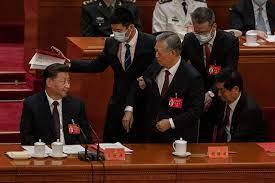(American fears about China dominating Asia are also excessive. China is surrounded by almost 20 countries, many of which are strategic rivals or ‘frenemies’ )
Chinese president Xi Jinping’s decision to skip the G20 Summit in New Delhi is likely an attempt to avoid losing face. It is largely felt that under Xi China has become more authoritarian.
In October 2022, a video is now shows how Xi’s immediate predecessor, Hu Jintao, now 80, was 'unceremoniously escorted out' of the Great Hall of the People at the party’s national congress.

Escorting out of Hu Jintao

Xi's Foreign Minister Qin Gang has been removed from that post for unknown reasons, with suspicions continuing to ripple through the ministry. The turmoil has worried many of the elders who ran the party during China’s economic ascent.
Sources said that ahead of Beidaihe, party elders convened their own meeting to summarize their opinions before conveying them to the current leaders. The meeting was likely held in the suburbs of Beijing. Afterward, only several of these elders traveled to Beidaihe to convey their consensus to the current leaders. The face-to-face meeting with the current leaders, including Xi, took place on a single day.
Reports say the informal discussions are never officially disclosed, but details of this year’s closed-door talks have begun to emerge.
In short, the conclave had a significantly different feel from the previous 10 Beidaihe meetings that have taken place since Xi became general secretary of the party in 2012.
Sources said that at this year’s gathering, a group of retired party elders reprimanded the top leader in ways they had not until now. Xi later expressed his frustration to his closest aides.
The challenges for China are multiple. High youth unemployment; high debt levels in both the private and public sectors; falling private investment as a result of intimidation by the ruling party.
There is ageing problem and also a commitment to state capitalism that hampers total factor productivity growth. On the other hand, experts say the US has "fanned Chinese fears" of containment by reinforcing its Indo-Pacific alliances through the Aukus pact, the Quad, and an Asian pivot by Nato.
In most of these say Indo Pacific and Quad, India is a key component. Aukus, is an acronym for the trilateral security pact between Australia, the United Kingdom, and the United States.
A first step to prevent a collision is recognizing that some of the reigning concerns are excessive. "For example, US anxiety about China’s economic rise is reminiscent of its attitude toward the rise of Japan decades ago.
After all, China has significant economic problems that could cut its potential growth to only 3-4% per year, far below the 10% annual growth rate that it achieved over the past few decades," says Nouriel Roubini, emeritus of economics at New York University.
An article in 'The Mint' by Roubini further says:
"Chinese domestic consumption has weakened, owing to uncertainty and the lack of a broad social safety net. With deflation setting in, China now must worry about Japanification: a long period of lost growth. Like so many emerging markets, it could end up in a “middle-income trap," rather than reaching No.1 status.
While the US may have overestimated China’s potential rise, it also may have underestimated its own lead in fields like artificial intelligence, machine learning, semiconductors, quantum computing, robotics and automation, and new energy sources such as nuclear fusion. China has invested in some of these areas under its ‘Made in China 2025’ programme, but its goal of achieving near-term dominance in 10 industries of the future seems far-fetched."







No comments:
Post a Comment